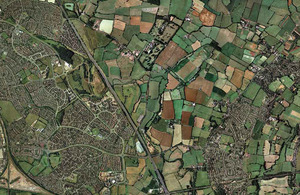First regional strategy to be abolished
Local Government Secretary Eric Pickles has announced a major milestone in the transfer of power to local communities.

Aerial view
This will be achieved when East England’s regional strategy becomes the first to be formally abolished.
The top-down approach of regional strategies from the last administration imposed centrally set building targets on communities rather than giving local people the powers to plan. The regional strategies coincided with the lowest peacetime levels of housebuilding since the 1920s.
Planning and housebuilding works best when it is locally-led and from 3 January 2013 councils and local people across the former government office region for the East of England once again have control of deciding and shaping development in the places where they live. An order to abolish the strategy was laid in Parliament today.
The abolition of the East’s regional strategy reinforces the importance of the local plan, produced with the involvement of local communities, as the keystone of the planning system.
Eric Pickles said:
“Regional planning built nothing but resentment.
“This is the next stage in the abolition of the whole tier of regional government in East England. We are devolving power from unelected regional quangos down to elected local councils and to local communities.”
The government made clear its commitment to return decision-making on housing and planning to local councils and to end the era of centrally-imposed targets which build resentment to development, and is introducing powerful incentives to ensure communities benefit from development.
Further information
- The Localism Act 2011 legislated to provide powers to abolish the last administration’s regional strategies. European Union law requires strategic environmental assessments to be undertaken.
- Yesterday (10 December 2012) the government announced councils who welcomed new development in the last year will share £661 million from the New Homes Bonus scheme, which pays a cash bonus for every new home built or brought back into use. Over the next year, England’s 353 councils are set to share in the cash payout after delivering 142,000 new homes in the last year, including 58,000 affordable properties, and bringing a further 13,000 long-term empty properties back into use.
- In addition the government is getting Britain building and has: * invested £19.5 billion of public and private funding in a programme to deliver 170,000 affordable homes, which is on track and exceeding expectations * introduced the FirstBuy scheme, which will help 27,000 first time buyers purchase a new build home, and the NewBuy Guarantee, which will help tens of thousands of aspiring homebuyers take their next step on the housing ladder with a fraction of the normal deposit, as little as 5%; leading house builders have recently praised these schemes for boosting the sales of new homes * identified enough formerly-used, surplus public sector land to support 100,000 new homes, and already sold enough of this land to deliver 33,000 new homes * introduced the £1.3 billion Get Britain Building and Growing Places schemes which will unlock stalled housing sites across the country
- The government’s reform package is working. The latest housebuilding figures show starts on new homes are up by 18% compared to the previous quarter, and year on year completions are up by 6%. Housing starts are 52% higher than 2009, and recent housing supply figures also show net supply is at the highest level since the tail end of the unsustainable housing boom in 2008.
- The ‘Strategic environmental assessment about revoking the East of England regional strategy: post adoption statement’ is available here.
- The written ministerial statement on the revocation of the East of England regional strategy can be found here.